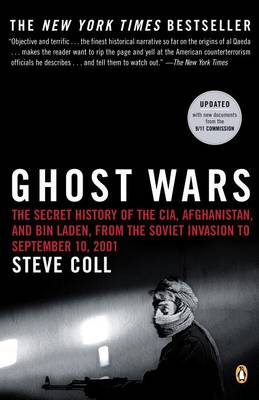Reviewed by gmcgregor on
Geopolitics in Central and South Asia turns out to be really complicated! The CIA's involvement began as a response to the Soviet invasion of Afghanistan, and the desire to have a firewall against the spread of Communism. It continued even after their withdrawal to both prevent a re-invasion and because of the US's relationship with Pakistan, which saw Afghanistan as a firewall of its own against India. And then there's Saudi Arabia, which had its own complicated relationships with not only Afghanistan, where it exported its brand of intense Islam, but of course the United States, as well as Pakistan. It's very messy, and trying to learn about it feels like intensely watching a magician to try to discern the sleight-of-hand...you've got your eye on one part of the stage, but to really understand the whole picture, there's something going on somewhere else that's going to be important to the way it comes together. And then of course there's the relationship of the CIA to their own government and the American public, which had a very real impact on how much, and how effectively, the CIA was able to actually do.
It becomes patently obvious while reading this book that there was very likely no one single factor that would have prevented terror attacks from taking place on American soil. There were too many forces that were all coming into alignment for it to be avoided entirely. But it does raise (without proselytizing about) issues that might have kept the particular 9/11 attack from coming to fruition that are, of course, all too easy to see in hindsight: US funding for the Northern Alliance, more willingness to heed the increasingly frenzied warnings that al-Qiada was eager and capable of an attack, a more forceful relationship with Pakistan, etc after etc. Coll doesn't try to lay blame at anyone in particular's feet, but he's also not interested in massaging or obscuring information that would let anyone claim absolution, either. He's interested in presenting as full a picture as he reasonably can, and he accomplishes that.
Considering that it's nonfiction designed to reach a mass audience, it's about as comprehensive as anyone should want/expect. In fact, if I'm being honest, its biggest flaw is that there is so much information being presented that it's overly dense. It's hard, because it never came off like there were details being dumped extraneously so it's not that it just needed a more diligent editor, but the reality is that it's a fact-heavy story, with a lot of new people/situations needing to be introduced to the reader with sufficient context, so the result is a book that ends up feeling kind of like a slog even though it's interesting and relevant. And honestly, I prefer that kind of approach to one that cuts out important bits to dumb itself down for the reader. To sum up, I do recommend this book if you're interesting in learning about the history of the US in Afghanistan. It's well-written and a very good resource. But if fact-intensive non-fiction isn't your jam and this isn't a subject of particular interest to you, there's no need to torture yourself.
Reading updates
- Started reading
- 17 January, 2018: Finished reading
- 17 January, 2018: Reviewed
